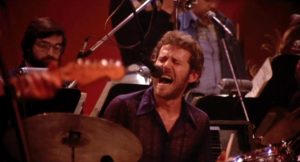STUDIO: Magnolia | DIRECTOR: Daniel Roher
RELEASE DATE: May 26, 2020 | PRICE: DVD $17.29, Blu-ray $19.29
SPECS: R | 100 min. | Documentary | 1.85:1 widescreen | stereo
RATINGS (out of 5 dishes): Movie| Audio
| Video
| Overall
There are two factions of fans of the rock group The Band, the outfit immortalized in Martin Scorsese’s classic 1978 concert film The Last Waltz.
One faction is pro-Robbie Robertson, the band’s guitarist and chief songwriter; the other side is pro-Levon Helm, the contingent’s drummer and sometime lead singer. Once Were Brothers: Robbie Robertson and The Band definitely falls into the pro-Robbie camp.
Inspired by Robbie Robertson’s 2016 autobiography Testimony, Once Were Brothers is a fairly straightforward account of the rise and fall of The Band as seen by Robertson. Mixing intimate archival footage and behind-the-scenes photographs of the group with energized vintage musical numbers and testimonials from the likes of Eric Clapton, Bruce Springsteen, Van Morrison, Taj Mahal and one-time Robertson roommate Martin Scorsese, Once Were Brothers will leave fans of the inventive rockers entranced and elated. Among the highlights is the Toronto-born Robertson recounting his helter-skelter early days leading The Hawks, backing group for Canadian blue singer Ronnie Hawkins, and the loving explanation by the film’s guest stars on how each band member lovingly brought their own specialty to the table.
Other facets of The Band’s history are wonderfully detailed. There are stories from their days at “Big Pink,” the house in Woodstock where they conceived their first albums and recorded The Basement Tapes with Bob Dylan, who they backed during his terribly received first electric tour. All other key points in the group’s history are covered, including The Last Waltz, perhaps the most memorable goodbye party in music history. At the same time, however, the history of the band’s in-fighting, career disagreements, tragic deaths and drug and alcohol issues are noted with candor, particularly by Dominique Bourgeois, Robbie’s ex-wife and mother of his three children.
Now, about the Robertson/Helm debate. Since the documentary is based on Robertson’s biography and he is the narrator of the film, the story is told strictly through his perspective. Many Band fans believe that Robertson shortchanged Helm—as well as other group members Garth Hudson, Richard Manuel and Rick Danko—by refusing to credit their contributions to such songs as “The Night They Drove Old Dixie Down,” “Up on Cripple Creek” and “The Weight.”
Thankfully, Robertson doesn’t skirt the issue altogether, although his reasoning for leaving Helm off the credits—and out of the publishing rights and royalties—is questionable at best. And you won’t find how Garth Hudson, the other surviving group member, feels about these issues, either: No recent interviews with the group’s 83-year-old resident musicologist and multi-instrumentalist is offered.
Still, those aware of The Band’s work are sure to gain a renewed enthusiasm and appreciation for their legacy with Once Were Brothers, whether they are Troop Robbie or Troop Levon.
|
Buy or Rent Once Were Brothers: Robbie Robertson and The Band
|
|---|

Leave a Reply